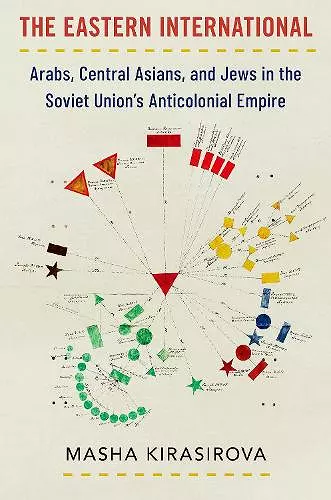The Eastern International
Arabs, Central Asians, and Jews in the Soviet Union's Anticolonial Empire
Format:Paperback
Publisher:Oxford University Press Inc
Published:19th Jun '24
Should be back in stock very soon
This paperback is available in another edition too:
- Hardback£75.00(9780197685693)

In the first few years after the Russian Revolution, an ideological project coalesced to link the development of what Stalin demarcated as the internal "East"--primarily Central Asia and the Caucasus--with nation-building, the overthrow of colonialism, and progress toward socialism in the "foreign East"--the Third World. Support for anti-colonial movements abroad was part of the Communist Party platform and shaped Soviet foreign policy to varying degrees thereafter. The Eastern International explores how the concept of "the East" was used by the world's first communist state and its mediators to project, channel, and contest power across Eurasia. Masha Kirasirova traces how this policy was conceptualized and carried out by students, comrades, and activists--Arab, Jewish, and Central Asian. It drew on their personal motivations and gave them considerable access to state authority and agency to shape Soviet ideology, inform concrete decisions, and allocate resources. Contextualizing these Eastern mediators within a global frame, this book historicizes the circulation of peoples and ideas between the socialist and decolonizing world and reinscribes Soviet history into postcolonial studies and global history.
In The Eastern International Masha Kirasirova tells a fascinating history of individuals, states, and empires. This important and well-argued book will inspire new debates in Middle Eastern Studies, Central Asian Studies, Soviet Studies, and Jewish History. Through its careful reconstruction of Soviet-Middle Eastern relations, it convincingly argues that we should not treat each of these scholarly subfields as separate. Rather, by combining archives, networks, and the movements of ideas, peoples, and policies across Soviet Russia, the Middle East, and Central Asia, The Eastern International considers these fields as a whole. It suggests new imaginings of the concept of the East in ways that move beyond the Eurocentric significations of the term, and it offers exciting intellectual imaginings in their stead. * Orit Bashkin, University of Chicago *
Kirasirova's long-awaited book fills in a critical blank spot in Western coverage of relations between metropolitan Soviet Russia, Central Asia, and the Global South (especially the Arab world). She has tapped a trove of archival material largely untouched by scholars to date and applied her impressive analytical skills in processing it. The result is a highly original study that challenges many of the current clichés about metropolitan-colonial interrelations in the Afro-Asian and Soviet worlds. * Katerina Clark, author of Eurasia Without Borders: Leftists Dream of a Literary Commons, 1919-1943 *
This is a fascinating study of the relationship between the domestic and foreign 'Easts' across the Soviet period. It exposes new ways to understand the USSR as a state set on global influence and also replete with contradictions in the way it treated non-European peoples. Masha Kirasirova shows how authors, filmmakers, and party members could use the ambivalences of Soviet rule to their advantage but also that there were always limits on their ability to act. The focus on Jewish-Arab tensions and on cultural diplomacy and the central role of Central Asia in Soviet Cold War transnational relationships are unique contributions. * Jeff Sahadeo, author of Russian Colonial Society in Tashkent, 1865-1923 *
With The Eastern International, Masha Kirasirova has authored an important contribution to a growing historiography of books that connect Soviet history and Central Asian history with the study of the Middle East. * Timothy Nunan, The Russian Review *
Highly original and engaging throughout, The Eastern International will be enlightening for anyone interested in the history of the USSR and the Middle East, the Cold War, anticolonialism and internationalism. * Mollie Arbuthnot, European History Quarterly *
Her thorough research draws from an array of evidence, including rich archival materials, interviews, newspapers, published documents, and films, with different source combinations anchoring each chapter. * S. G. Jug, CHOICE *
Kirasirova offers a detailed account of the Soviet Union's global anticolonial efforts and the role of Central Asian figures within the "Eastern International." She provides valuable insights into the complexities of Soviet statecraft and its impact on global and regional politics. * Aleksandr Korobeinikov, CEU Review of Books *
Kirasirova offers a detailed account of the Soviet Union's global anticolonial efforts and the role of Central Asian figures within the "Eastern International." She provides valuable insights into the complexities of Soviet statecraft and its impact on global and regional politics. * Aleksandr Korobeinikov, CEU Review of Books *
The Eastern International advances conversations about the Soviet Union and decolonization. Among its many valuable contributions, Kirasirova's work pushes readers to think broadly about the Bolsheviks' interconnected attempts to address questions of empire at home and abroad. * Samuel J. Hirst, Review of Middle East Studies *
ISBN: 9780197685709
Dimensions: 226mm x 160mm x 38mm
Weight: 590g
412 pages